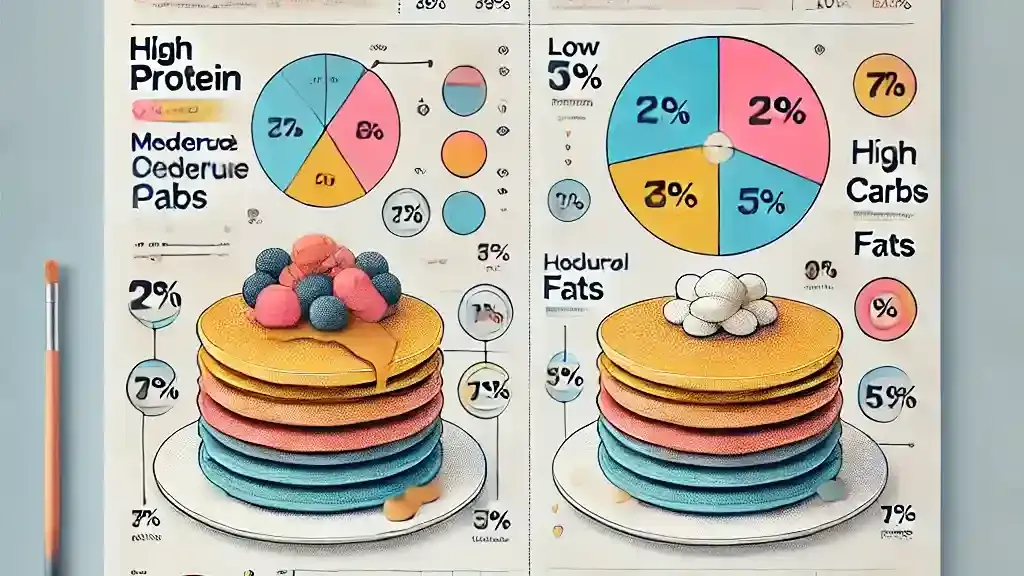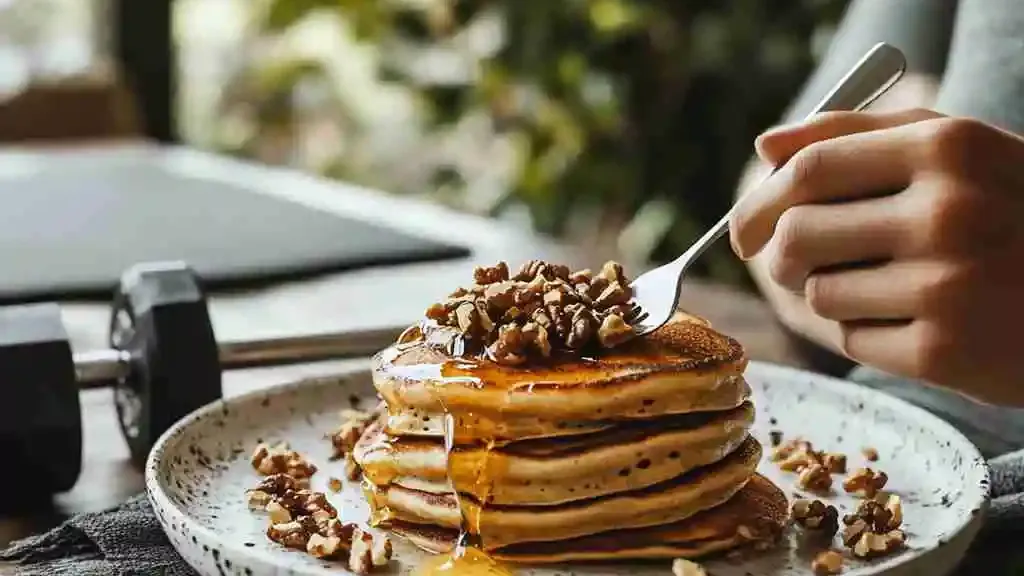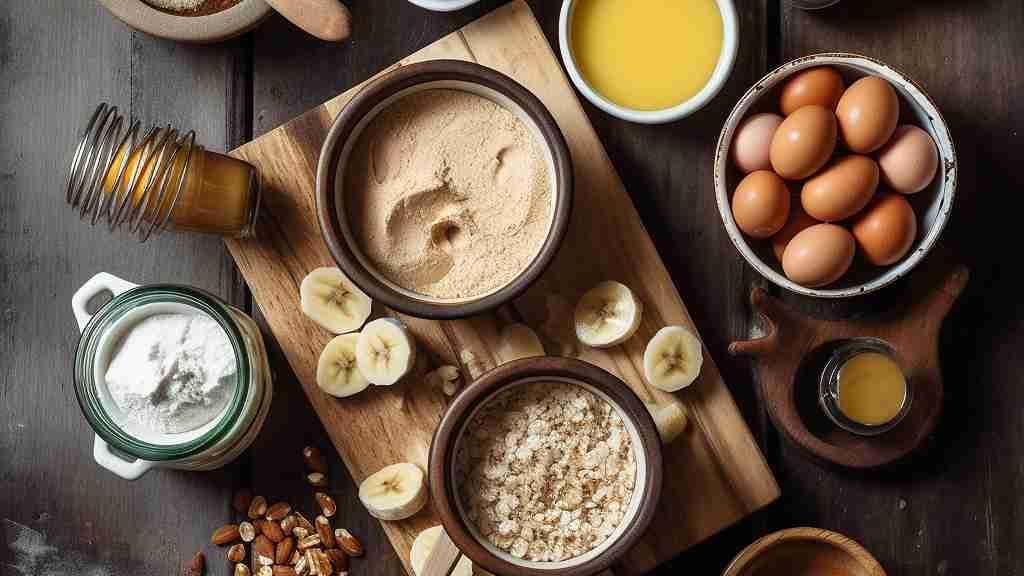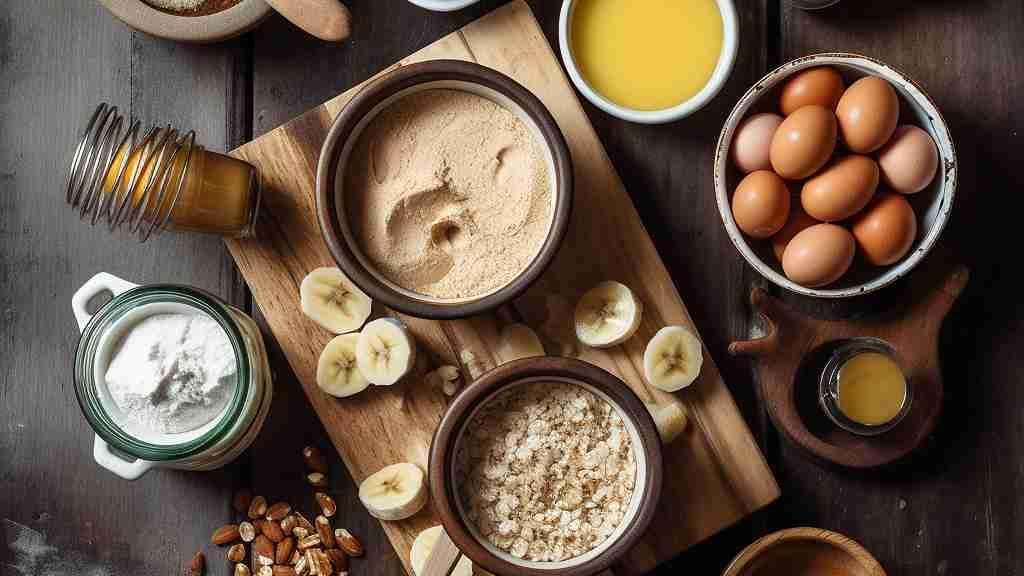Are protein pancakes healthy? If you love pancakes but want a more nutritious option, you’ve probably wondered whether protein pancakes are healthy compared to traditional ones. You wake up craving something fluffy and delicious, but you also need a meal that keeps you full and energized. Instead of loading up on sugar and refined carbs, protein pancakes offer a balanced mix of protein, fiber, and essential nutrients. But are protein pancakes healthy enough to be a daily breakfast choice? Let’s break it down and see if they truly live up to the hype.
Table of contents
Nutritional Composition of Protein Pancakes
Are protein pancakes healthy? If you’re looking for a nutritious breakfast that keeps you full and energized, you’ve probably considered swapping traditional pancakes for a protein-packed alternative. Unlike regular pancakes, which are often loaded with sugar and refined carbs, protein pancakes provide a balanced mix of protein, fiber, and essential nutrients. But are protein pancakes healthy enough to be a daily breakfast choice? With the right ingredients, they can be a great option for muscle recovery, weight management, and sustained energy. However, not all protein pancakes are created equal—some store-bought mixes contain added sugars and artificial ingredients.
Can I Add Protein to My Pancake Mix? Absolutely! If you’ve ever wondered, “Are protein pancakes healthy?”, the good news is that adding protein to your pancake mix is a simple way to boost its nutritional value. You can mix in protein powder, Greek yogurt, or egg whites to increase the protein content while keeping your pancakes fluffy and delicious. By making these adjustments, you can turn a regular breakfast into a balanced meal that supports muscle recovery and keeps you full longer. Are protein pancakes healthy when made this way? Yes! Choosing the right ingredients ensures your pancakes are both nutritious and satisfying. Find out the best ways to add protein to your pancake mix here. Find out the best ways to add protein to your pancake mix here.
Key Ingredients: What Goes into Protein Pancakes?
The beauty of protein pancakes is that they can be made with a variety of wholesome ingredients. Each ingredient plays a crucial role in ensuring you get a balanced meal packed with protein, fiber, and essential nutrients.
- Protein Powder – The star ingredient in protein pancakes. Whether it’s whey, casein, or plant-based (pea, soy, or hemp), it boosts the protein content, making these pancakes more filling and muscle-friendly.
- Eggs or Egg Whites – A natural protein source that adds structure and fluffiness to protein pancakes.
- Oats or Whole Wheat Flour – These complex carbs provide fiber, keeping you full longer and stabilizing blood sugar levels.
- Greek Yogurt or Cottage Cheese – These dairy sources contribute extra protein, calcium, and probiotics, making your protein pancakes even more nutritious.
- Banana or Applesauce – Natural sweeteners that replace refined sugar while adding vitamins and fiber.
- Milk or Almond Milk – The liquid base that blends everything together, adding a bit of creaminess to your protein pancakes.
Macronutrient Breakdown: The Power of Balance
When it comes to nutrition, balance is key. Protein pancakes strike the perfect harmony between protein, carbohydrates, and fats, making them an excellent meal for sustained energy.
| Nutrient | Amount (Per Serving – 3 Pancakes) | Benefit |
|---|---|---|
| Calories | 250-350 kcal | Provides energy without excess calories |
| Protein | 20-30g | Supports muscle growth and keeps you full |
| Carbohydrates | 30-40g | Supplies energy and fiber for digestion |
| Fats | 5-10g | Helps with nutrient absorption and brain function |
| Fiber | 4-6g | Aids digestion and promotes gut health |
“Protein pancakes give you the best of both worlds energy from carbs, fullness from protein, and satisfaction from healthy fats.”
Micronutrient Profile: More Than Just Macros
Beyond the big three macronutrients, protein pancakes also pack a punch when it comes to micronutrients those essential vitamins and minerals that keep your body running smoothly.
- Calcium – Found in dairy and fortified plant-based milk, it strengthens bones and teeth.
- Iron – Present in whole grains and plant-based proteins, it helps transport oxygen in the blood.
- Magnesium – Supports muscle function, nervous system health, and energy production.
- B Vitamins – Crucial for metabolism, brain health, and converting food into energy.
“Think of protein pancakes as a tiny nutrition powerhouse every bite is loaded with nutrients that keep your body and mind in top shape.”
Why This Matters?
A nutritious breakfast sets the tone for your day, and protein pancakes do more than just satisfy hunger they fuel your body with high-quality nutrients. Whether you’re an athlete, a busy professional, or simply a pancake lover, this meal is a delicious and effective way to start your morning right.
So, next time you’re thinking about what to eat for breakfast, why settle for empty carbs when you can have a nutrient-packed stack of protein pancakes?

Health Benefits of Protein Pancakes
1. High Protein Content
Protein plays a crucial role in muscle repair, keeping you full, and supporting overall health. Unlike traditional pancakes, which are carb-heavy, protein pancakes provide a solid protein boost.
“Your body is like a house, and protein is the brick that holds it together. Without enough bricks, the structure weakens!”
2. Satiety and Weight Management
Ever eaten a stack of regular pancakes, only to feel hungry an hour later? That’s because simple carbs digest quickly. Are protein pancakes healthy in comparison? Yes! Protein slows digestion, keeping you full longer and reducing unnecessary snacking. By choosing high-protein ingredients, you can enjoy a more balanced and satisfying meal.
3. Customization for Dietary Needs
Protein pancakes are highly adaptable! Gluten-free? Use oat or almond flour. Dairy-free? Swap in plant-based milk. Need extra fiber? Add flaxseeds or chia seeds.
4. Nutrient Density
Unlike sugary cereals or plain toast, protein pancakes deliver a well-rounded mix of protein, fiber, and essential vitamins all in one tasty meal.

Potential Drawbacks of Protein Pancakes
Even though protein pancakes are a healthy breakfast choice, there are some potential downsides:
1. High-Calorie Content
While protein pancakes are nutritious, they can also be calorie-dense, depending on the ingredients used.
2. Added Sugars and Artificial Ingredients
Not all protein pancake mixes are created equal some contain artificial sweeteners, preservatives, and hidden sugars.
3. Over-Reliance on Protein
While protein pancakes are great, a balanced diet includes vegetables, whole grains, and healthy fats.
4. Digestive Issues
Some people experience bloating from protein powder or high-fiber ingredients. Choose digestive-friendly options if needed.
2. Added Sugars and Artificial Ingredients
Not all protein pancakes are created equal. Many store-bought protein pancake mixes contain artificial sweeteners, preservatives, and hidden sugars, which can impact their nutritional value and raise the question: Are protein pancakes healthy when made with these ingredients? Choosing homemade or minimally processed options ensures better health benefits.
“If you can’t pronounce half the ingredients on the label, do you really want to eat it?”
Some protein pancake recipes also call for sugar-heavy ingredients like flavored syrups or processed protein powders with added sweeteners. These can lead to energy crashes, increased cravings, and even digestive discomfort. To keep your protein pancakes healthy, choose natural sweeteners like mashed bananas, unsweetened applesauce, or honey.
3. Over-Reliance on Protein
Protein pancakes are an excellent source of protein, but relying too much on them can lead to an imbalanced diet. Protein is essential, but your body also needs vitamins, minerals, and fiber from other food sources. If you’re eating protein pancakes every day, you may be missing out on important nutrients found in vegetables, whole grains, and healthy fats.
“Your body needs more than just protein it thrives on variety!”
Additionally, excessive protein intake can put stress on the kidneys, especially for those with pre-existing kidney conditions. It’s best to enjoy protein pancakes as part of a diverse and balanced diet rather than making them your sole breakfast choice.
4. Potential Digestive Issues
Some people experience bloating, gas, or stomach discomfort after eating protein pancakes. This can be due to a few factors:
- Protein powder sensitivity – Whey protein, in particular, can cause bloating if you’re lactose intolerant.
- High fiber content – Ingredients like oats, flaxseeds, and chia seeds can cause digestive discomfort in large amounts.
- Artificial sweeteners – Sugar alcohols like erythritol and sucralose may lead to bloating or stomach cramps.
“Your stomach needs time to adjust don’t overload it all at once!”
To minimize digestive issues, start with small portions and drink plenty of water. If dairy is an issue, opt for plant-based protein powders like pea or soy protein.
5. Cost and Accessibility
Another potential drawback of protein pancakes is cost. High-quality protein powders, almond flour, and specialty ingredients can be expensive compared to traditional pancake ingredients like flour and eggs. Not everyone has access to these products, making protein pancakes less practical for some people.
| Ingredient | Average Cost (Per Pound) |
|---|---|
| Whey protein powder | $20-$40 |
| Almond flour | $10-$15 |
| Chia seeds | $8-$12 |
| Maple syrup | $8-$12 |
“Eating healthy doesn’t have to break the bank sometimes, simple ingredients work just as well!”
If cost is a concern, you can still enjoy protein pacakes by using more affordable ingredients like oats, eggs, and Greek yogurt instead of relying on expensive protein powders.

Comparing Protein Pancakes to Alternatives
Protein blueberry pancakes are a fantastic breakfast choice, but are protein pancakes healthy compared to other options? Whether you’re considering traditional pancakes or other high-protein meals, it’s important to compare nutrition, satiety, and overall health benefits. Are protein pancakes healthy enough to be a better alternative? Let’s break it down.
1. Protein Blueberry Pancakes vs. Traditional Pancakes
Traditional pancakes are typically made with white flour, sugar, and milk, making them high in carbohydrates but low in protein and fiber. While they provide quick energy, they often lead to sugar crashes and hunger soon after eating. On the other hand, protein blueberry pancakes are made with high-protein ingredients like protein powder, Greek yogurt, or egg whites, helping to keep you full for longer.
| Feature | Protein Blueberry Pancakes | Traditional Pancakes |
|---|---|---|
| Protein | 20-30g | 5-8g |
| Carbohydrates | 30-40g | 40-50g |
| Fiber | 4-6g | 1-2g |
| Sugar | Low (if using natural sweeteners) | High (from refined sugar and syrup) |
| Satiety | Keeps you full longer | Quick energy, but hunger returns faster |
“Why settle for an energy crash when you can fuel your body with lasting energy?”
Protein blueberry pancakes clearly offer more nutritional benefits, making them the better choice for those looking to stay full and energized.
2. Protein Blueberry Pancakes vs. Other High-Protein Breakfasts
Other high-protein breakfasts, such as omelets, Greek yogurt with nuts, or protein smoothies, provide a good amount of protein. But are protein pancakes healthy in comparison? Yes! Protein blueberry pancakes offer a balanced mix of protein, fiber, and carbohydrates, making them a complete and satisfying meal.
For those who enjoy a sweet breakfast but still want a high-protein option, protein blueberry pancakes are an excellent choice. They provide muscle-building protein, gut-friendly fiber, and natural sweetness from blueberries without excessive sugar.
“Protein blueberry pancakes aren’t just delicious they’re a well-rounded meal that fuels your body the right way!”
In the end, protein blueberry pancakes are a superior choice compared to traditional pancakes and can compete with other high protein breakfasts due to their balanced nutrient profile. Whether you’re an athlete, a busy professional, or just someone who loves pancakes, they offer a delicious and healthy way to start the day.
Making Protein Pancakes Healthier
1. Choose Healthier Ingredients
Ditch processed mixes and use whole food ingredients. Go for oat flour, unsweetened almond milk, and natural sweeteners like bananas or honey.
2. Add Nutrient-Rich Toppings
Instead of drowning your pancakes in syrup, try:
- Fresh berries (antioxidants)
- Greek yogurt (extra protein)
- Nuts/seeds (healthy fats)
3. Focus on Portion Control
Just because they’re healthy doesn’t mean you should eat a mountain of them! Stick to 3-4 pancakes per serving.
4. Cook with Care
Use non-stick pans and minimal oil to keep calories in check. Avoid burning, as charred food can form harmful compounds.
FAQs on Protein Pancakes
1. Are protein pancakes good for weight loss?
Yes! High protein and fiber content help keep you full and reduce cravings, making it easier to manage calorie intake.
2. Can you eat protein pancakes every day?
Absolutely, as long as you vary your nutrients and balance your overall diet.
3. What are the healthiest ingredients for protein pancakes?
Oats, eggs, protein powder, unsweetened almond milk, and natural sweeteners like bananas or honey.
4. Do protein pancakes taste good?
If made right, they’re delicious! The key is balancing the right ingredients and adding flavorful toppings.
5. Can I make vegan protein pancakes?
Yes! Use plant-based protein powder, flax eggs, and almond or oat milk for a vegan-friendly version.
Conclusion
Protein pancakes are more than just a fitness trend—they’re a nutritious, delicious, and versatile breakfast option. Are protein pancakes healthy? Absolutely! Whether you’re fueling a workout, managing your weight, or simply looking for a healthier breakfast, they’re a fantastic choice.
So, next time you’re rushing in the morning, remember: a good day starts with a good breakfast. Why not make it a stack of protein pancakes? 🍽️


